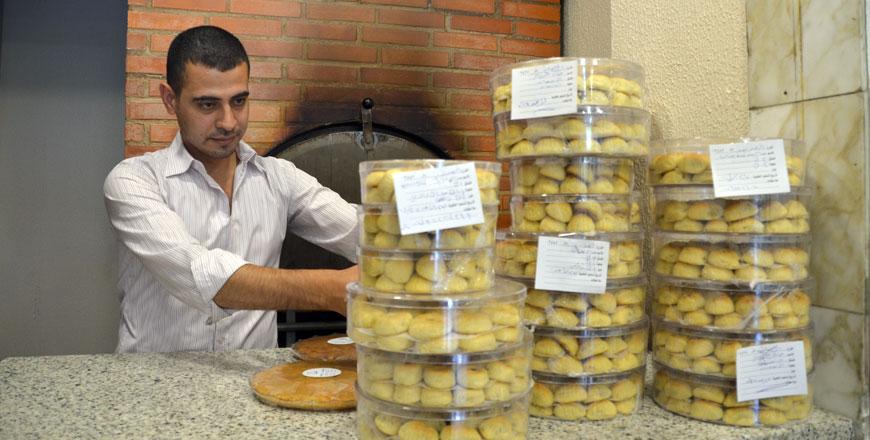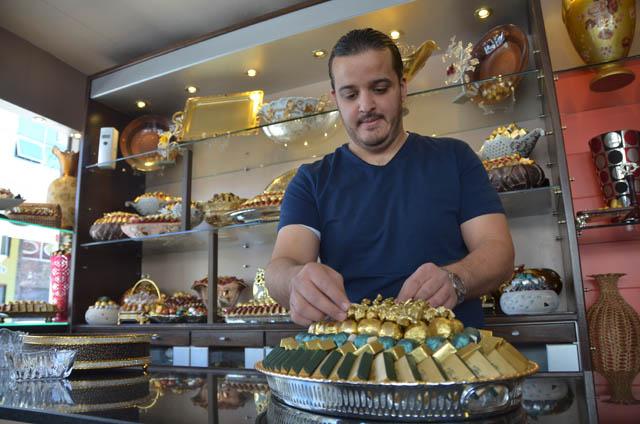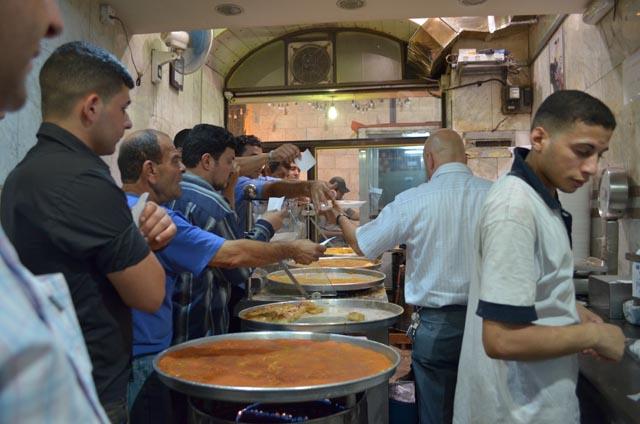You are here
‘Consumers expected to spend JD4 million on sweets during Eid’
By Dana Al Emam - Jul 15,2015 - Last updated at Jul 15,2015

Jordanians typically serve mamoul, the sweet cake stuffed with date paste, walnut or pistachio, and the bitter, cardamom-flavoured Arabic coffee to visitors during Eid (File photo)
AMMAN — Jordanians and guests are expected to spend up to JD4 million on sweets during Eid Al Fitr holiday, including some JD1.7 million on mamoul, the holiday’s traditional dessert, a sector leader said Wednesday.
Although some big families with limited income still hold on to the tradition of preparing mamoul at home, many choose to buy the sweet cake stuffed with date paste, walnut or pistachio from sweets stores, said Raed Hamada, president of the Jordan Association for Restaurants and Sweets Shops Owners.
Prices of mamoul vary according to the type and size of the filling as well as the quality of the ingredients used, he said, adding that one kilogramme is sold for between JD3-12 in typical shops, and it is difficult to calculate the cost of homemade mamoul.
Over the four-day vacation, which starts on Friday and continues through Monday, many families are expected to eat out, as the Eid falls during the summer vacation for schools and expatriates, according to Hamada.
The first day of Eid, which is expected to be Friday depending on the sighting of the new lunar month’s moon, usually witnesses a sharp rise in demand on fast food delivery, while families prefer to go to restaurants on the second day.
“We expect a very active period until the back-to-school season,” Hamada told The Jordan Times over the phone, adding that Ramadan over the past six years has been “very busy” as it comes during the summer.
He noted that restaurants witness the peak of demand after taraweeh prayer (around 10:30pm) until just before dawn, when families and young people like to have their sohour out to prepare for the day-long fast.
Citing a “slight” increase in sales at the some 15,000 restaurants, cafeterias and sweets shops across the Kingdom compared to Ramadan last year, he said prices of the majority of food items have not increased over the past four years.
The increase in restaurant clientele during Ramadan was accompanied by a 15-30 per cent drop in the sales of food items compared to the fasting month last year, according to Foodstuff Traders Association President Khalil Haj Tawfiq.
He attributed the decrease to the fact that Ramadan came in the middle of the month, while the majority of employees in the Kingdom receive their salaries at the end of the month.
Haj Tawfiq also cited the regression in Jordanians’ purchasing power as living expenses increase while salaries remain the same.
After receiving their salaries, peoples’ main concern shifted from buying poultry, rice and sugar to preparing for the Muslim feast marking the end of the fasting month, with an “active demand” for chocolate, sweets, Arabic coffee and mamoul ingredients.
“Charity societies and private institutions bought over 150,000 food packages to distribute to the underprivileged… many merchants delivered aid to Syrian refugees in the Kingdom and those in Syria living near the border in cooperation with international agencies,” Haj Tawfiq told The Jordan Times.
Although this Ramadan was “the worst in five years”, he expected Thursday to be a “very busy” day for business and called on consumers to shop early in the day and not to wait until Eid is officially announced.
But for Hamada, last-minute shopping for Eid is part of a “celebratory” spirit that Jordanians enjoy.
Related Articles
With the approach of the Eid Al Fitr holiday, consumers' demand for sweets, especially mamoul and chocolate, has increased significantly.
Jordanians usually buy over 200,000 kilogrammes of sweets, mainly knafah, during the five hours that follow the announcement of Tawjihi results, a sector leader said Tuesday.
AMMAN – Some people are set to give up some of their long-standing traditions on the week leading to Eid Al Adha, Muslims’ bigge














